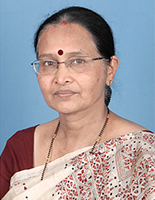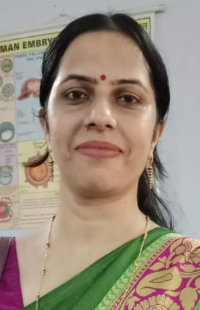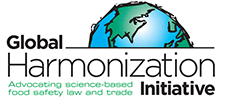India
Ambassadors

Prof. Jamuna Prakash, PhD
Professor Department of Food Science and Nutrition, University of Mysore
Mysore, India

Dr. Sunita Singh
Assistant Professor
Department Of Chemistry,
Navyug Kanya Mahavidyalaya,
University Of Lucknow
India

Dr. Monika Chauhan
Senior Public Health Nutritionist
Dr. Rashmi Kulshrestha
CEO of the consultancy company "Regulatory Wisdom"
New Delhi, India
Ambassador’s Report
Prof. Jamuna Prakash:
Coming from a developing country where food safety norms are evolving and implementation is being enforced, it is important to create awareness regarding food safety among all, whether a common man or a food business operator. Hence, as a GHI Ambassador, efforts are being continued to spread knowledge regarding safe food among different groups of the population staring from school children, college students to professionals in the field.
Dr. Sunita Singh:
As a GHI Ambassador, my primary goal is to foster awareness, collaboration, and capacity-building in the field of food safety and nutrition within India and beyond. Drawing upon my academic and research experience in the chemistry, antioxidant, and antimicrobial activities of essential oils and oleoresins, I aim to bridge the gap between scientific evidence and regulatory frameworks. My vision is to contribute to the harmonization of food laws and standards so that safe, nutritious, and high-quality food becomes accessible across global communities.
I intend to:
- Promote Scientific Exchange – Encourage dialogue between researchers, regulators, industry, and academia to align food safety practices with global standards.
- Strengthen Regional Awareness – Sensitize stakeholders in India about the significance of globally harmonized regulations and their direct impact on consumer health, trade, and food security.
- Support Education and Training – Develop outreach activities, workshops, and academic collaborations to equip the next generation with knowledge of harmonized food laws and sustainable nutrition practices.
- Advocate for Evidence-Based Policy – Utilize scientific findings to inform policymakers on the importance of harmonization in reducing risks of foodborne illness, ensuring nutritional quality, and promoting international trade.
Why Global Harmonization is Important for India/Region
In a country like India, with its vast biodiversity, rapidly growing population, and expanding food industry, harmonization of food safety and nutrition regulations is of critical importance. Differences in standards between nations often create barriers in food trade, limit innovation, and compromise consumer safety. By aligning with global frameworks:
- Consumer Health Protection: Harmonized standards ensure that consumers have access to food that is consistently safe, nutritious, and free from harmful contaminants.
- Trade Facilitation: Uniform regulations reduce non-tariff barriers, enabling Indian food products, spices, oils, and nutraceuticals to access international markets more effectively.
- Innovation and Research: A globally aligned regulatory environment encourages innovation in food science, functional foods, and nutraceuticals by providing clarity and predictability for researchers and industry.
- Sustainability and Food Security: Global cooperation strengthens resilience against emerging challenges such as climate change, antimicrobial resistance, and food fraud, which have direct implications for India’s food supply chain.
Dr. Monika Chauhan:
As a GHI Ambassador, my goal is to promote awareness of the Global Harmonization Initiative’s mission, strengthen networks of experts, policymakers, and institutions, and share GHI knowledge and consensus documents across my country and region. I will raise GHI’s visibility through conferences, publications, and outreach, while also fostering dialogue with government authorities to integrate global best practices into local food safety and nutrition policies. At the same time, I will encourage experts and researchers to join GHI working groups and contribute to consensus-building efforts.
Global harmonization of food safety and nutrition laws is crucial for my region, where undernutrition and food safety challenges coexist with rapidly expanding food markets. Fragmented regulations often create barriers to safe food access, hinder innovation, and erode consumer trust. Harmonized standards strengthen public health, support fair trade, and ensure consumers have access to safe and nutritious food. As a GHI Ambassador, my goal is to help bridge science and policy, foster trust, and position my country as an active contributor to shaping global standards.
As a GHI Ambassador, I plan to actively promote the mission and activities of the initiative within my region. One of my priorities will be to translate key GHI information and resources into local languages, ensuring that knowledge is accessible to a wider audience. I also intend to contribute articles and opinion pieces to local food magazines and professional publications to raise awareness of food safety, nutrition, and harmonization efforts.
To strengthen engagement with policymakers, I will share GHI press releases and position papers with food safety authorities, supporting evidence-based decision-making. Additionally, I will give presentations at conferences, workshops, and community events to highlight GHI’s global work while building stronger local connections.
In addition to these planned activities, I will leverage my professional networks and experience in nutrition, food safety, and public health to strengthen GHI’s visibility and impact in the region. I intend to foster collaborations between academic institutions, industry partners, and government bodies, while also engaging with grassroots organizations and community groups to ensure that harmonized food safety practices reach diverse populations. I am also committed to encouraging young professionals and students to engage with GHI’s work, thereby building the next generation of experts who will carry forward the mission of safe and nutritious food for all.
Dr. Rashmi Kulshrestha:
India is a developing country and new food regulations were framed in 2006 by enactment of Food Safety and Standards Act 2006 and Rules 2011. This regulation for the first time emphasized on the Food Safety and Standards. The earlier law, Prevention of Food Adulteration Act 1954 and Rules 1955 emphasized only on Adulteration and not on Food Safety and Standards.
For the first time the Section 22 of the Food Safety and Standards Act 2006 included norms fore Health supplements, Nutraceuticals, Food for Special Dietary Uses, Food For Special Medical purpose etc and accordingly the Rules were framed.
However, these regulations are not harmonised with global regulations and not based on up-to-date science e.g the levels of vitamins, minerals and other nutrients for which RDA’s are available, the current regulation mentions that the maximum permitted levels of these nutrients cannot exceed One RDA whereas the global regulations includes Tolerable Upper Intake Level (UL) as the maximum permitted levels for these nutrients. As published scientific literature supports that consuming of nutrients from foods, food supplements at just RDA levels can only prevent deficiency diseases but consuming several times RDA makes an individual healthy.
Similarly, there are numerous gaps in the food regulations of India which needs to be aligned/ harmonized with global regulations and ensure it is updated with recent scientific evidence eg. there are gaps in analytical methods and limits for contaminants in current food regulation and not aligned with global regulations and science.
Dr. Rashmi Kulshrestha's research work has been on Pesticide Residues and Aflatoxins in Herbal drugs which are contaminants also for food products and hence are of great safety concern for every country and hence to the respective Regulatory bodies. This was the basis of her selection to the First Scientific Panel for Contaminants in Food Chain of the Regulatory Agency of India, Food Safety and Standards Authority of India (FSSAI) which regulates food, health supplements etc .in India (Tenure 2009 to 2013).
Dr. Rashmi Kulshrestha's plans as ambassador for India:
- I wish to establish Food Clubs in Government Schools in New Delhi (the capital of India) to educate children and students about hygiene, sanitation practices, and the importance of consuming safe and nutritious food and drinking safe water, with the support of GHI. Currently, many children and adults consume food that satisfies hunger and quenches thirst but lacks proper nutrition and a balanced diet in their daily routines. This initiative aims to provide them with the right knowledge, helping them lead healthier and better lives. It will be implemented through workshops and presentations in schools.
- I would like to share GHI press releases with the Food Safety and Standards Authority of India (FSSAI) to enhance awareness.
- I am currently working closely with the Regulatory Agency of India (FSSAI) to harmonize Indian food regulations with global standards and current scientific findings. This effort will be further strengthened under the guidance of the GHI leadership team.
- I am presently part of GHI’s Working Groups on Food Waste, Risk Assessment and Management, and the Research Group for Global Safe Water. I aim to learn from these groups and apply the knowledge and best practices in India.
Activities and Presentations
Prof. Jamuna Prakash:
Title: Emerging Food Regulatory Scenario: Role of Dieticians
Conference: 5th International Congress on Patient Safety
Apollo Hospitals | 16-17 October 2015 | Bangalore, India
Title: Food Safety Concerns: How to Select Safe Foods?
Event: Nutrition Week Celebrations, Alva’s College
8 September 2015 | Moodbidri, India
Special Lecture: Food Safety Concerns: What You Should Know.
Event: Department of Foods and Nutrition, PSG College of Arts and Science
18 August 2015 | Coimbatore, India
Title: Food Safety: How to Ensure the Food on Your Plate is Safe to Eat?
Event: World Health Day, Department of Public Health Dentistry. JSS Dental College and Hospital
11 April 2015 | Mysore, India
Title: Food Safety in Selected IT Companies: A Status Report
Conference: Nutrizione-15, National Conference on Nutritional, Functional and Safety Challenges of Food
SRM University | 26-27 March 2015 | Chennai, India
Dr. Sunita Singh:
Title: Webinar on Nutritional Opportunities Today
View here: Youtube
Publications
Prof. Jamuna Prakash:
Chapter: Fermented Cereals and Legumes (pp. 283-310)
Book Title: Regulating Safety of Traditional and Ethnic Foods
Author: Jamuna Prakash
Publication and Date: December 2015 | Elsevier Academic Press
